2020高考英语新课标全国卷三
2020年全国统一高考英语试卷(新课标ⅲ)(含解析版)
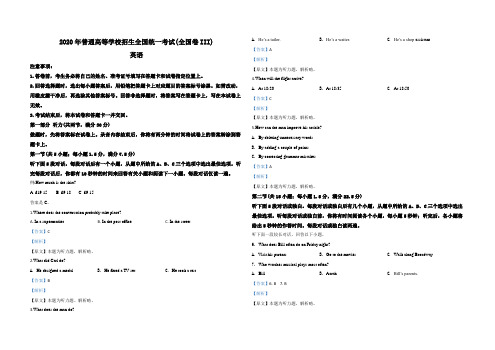
2020年普通高等学校招生全国统一考试(全国卷III)英语注意事项:1.答卷前,考生务必将自己的姓名、准考证号填写在答题卡和试卷指定位置上。
2.回答选择题时,选出每小题答案后,用铅笔把答题卡上对应题目的答案标号涂黑。
如需改动,用橡皮擦干净后,再选涂其他答案标号。
回答非选择题时,将答案写在答题卡上,写在本试卷上无效。
3.考试结束后,将本试卷和答题卡一并交回。
第一部分听力(共两节,满分30分)做题时,先将答案标在试卷上。
录音内容结束后,你将有两分钟的时间将试卷上的答案转涂到答题卡上。
第一节(共5小题;每小题1.5分,满分7.5分)听下面5段对话。
每段对话后有一个小题,从题中所给的A、B、C三个选项中选出最佳选项。
听完每段对话后,你都有10秒钟的时间来回答有关小题和阅读下一小题。
每段对话仅读一遍。
例:How much is the shirt?A. £19.15.B. £9.18.C. £9.15.答案是C。
1.Where does the conversation probably take place?A. In a supermarket.B. In the post office.C. In the street.【答案】C【解析】【原文】本题为听力题,解析略。
2.What did Carl do?A. He designed a medal.B. He fixed a TV set.C. He took a test.【答案】B【解析】【原文】本题为听力题。
解析略。
3.What does the man do? A. He’s a tailor. B. He’s a waiter. C. He’s a shop assistant.【答案】A【解析】【原文】本题为听力题,解析略。
4.When will the flight arrive?A. At 18:20.B. At 18:35.C. At 18:50.【答案】C【解析】【原文】本题为听力题,解析略。
2020年普通高等学校招生全国统一考试:全国卷Ⅲ【英语】试题(含答案)

『2020年普高学校招生全国统一考试』『知己知彼·百战不殆』绝密★启用前2020年普通高等学校招生全国统一考试(全国卷III)英语注意事项:1. 答卷前,考生务必将自己的姓名、准考证号填写在答题卡和试卷指定位置上。
2. 回答选择题时,选出每小题答案后,用铅笔把答题卡上对应题目的答案标号涂黑。
如需改动,用橡皮擦干净后,再选涂其他答案标号。
回答非选择题时,将答案写在答题卡上,写在本试卷上无效。
3. 考试结束后,将本试卷和答题卡一并交回。
第一部分听力(共两节 ,满分30分)做题时 ,先将答案标在试卷上。
录音内容结束后 ,你将有两分钟的时间将试卷上的答案转涂到答题卡上。
第一节(共5小题;每小题1.5分,满分7.5分)听下面5段对话。
每段对话后有一个小题,从题中所给的A、B、C三个选项中选出最佳选项。
听完每段对话后,你都有10秒钟的时间来回答有关小题和阅读下一小题。
每段对话仅读一遍。
例:How much is the shirt?A. £19.15.B. £9.18.C. £9.15.答案是C。
1. Where does the conversation probably take place?A. In a supermarket.B. In the post office.C. In the street.2. What did Carl do?A. He designed a medal.B. He fixed a TV set.C. He took a test.3. What does the man do?A. He’s a tailor.B. He’s a waiter.C. He’s a shop assistan t.4. When will the flight arrive?A. At 18:20.B. At 18:35.C. At 18:50.5. How can the man improve his article?A. By deleting unnecessary words.B. By adding a couple of points.C. By correcting grammar mistakes.第二节(共15小题;每小题1.5分,满分22.5分)听下面5段对话或独白。
2020年全国卷Ⅲ英语高考试题及答案(word版)
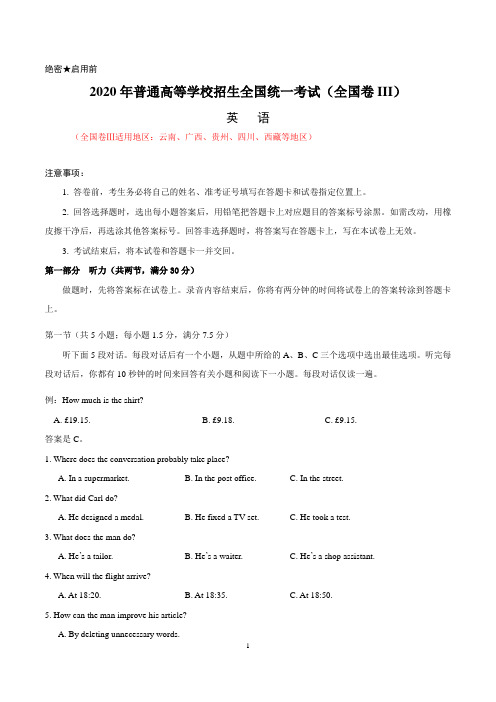
绝密★启用前2020年普通高等学校招生全国统一考试(全国卷III)英语(全国卷Ⅲ适用地区:云南、广西、贵州、四川、西藏等地区)注意事项:1. 答卷前,考生务必将自己的姓名、准考证号填写在答题卡和试卷指定位置上。
2. 回答选择题时,选出每小题答案后,用铅笔把答题卡上对应题目的答案标号涂黑。
如需改动,用橡皮擦干净后,再选涂其他答案标号。
回答非选择题时,将答案写在答题卡上,写在本试卷上无效。
3. 考试结束后,将本试卷和答题卡一并交回。
第一部分听力(共两节,满分30分)做题时,先将答案标在试卷上。
录音内容结束后,你将有两分钟的时间将试卷上的答案转涂到答题卡上。
第一节(共5小题;每小题1.5分,满分7.5分)听下面5段对话。
每段对话后有一个小题,从题中所给的A、B、C三个选项中选出最佳选项。
听完每段对话后,你都有10秒钟的时间来回答有关小题和阅读下一小题。
每段对话仅读一遍。
例:How much is the shirt?A. £19.15.B. £9.18.C. £9.15.答案是C。
1. Where does the conversation probably take place?A. In a supermarket.B. In the post office.C. In the street.2. What did Carl do?A. He designed a medal.B. He fixed a TV set.C. He took a test.3. What does the man do?A. He’s a tailor.B. He’s a waiter.C. He’s a shop assistant.4. When will the flight arrive?A. At 18:20.B. At 18:35.C. At 18:50.5. How can the man improve his article?A. By deleting unnecessary words.B. By adding a couple of points.C. By correcting grammar mistakes.第二节(共15小题;每小题1.5分,满分22.5分)听下面5段对话或独白。
2020年高考英语全国Ⅲ卷(解析版)
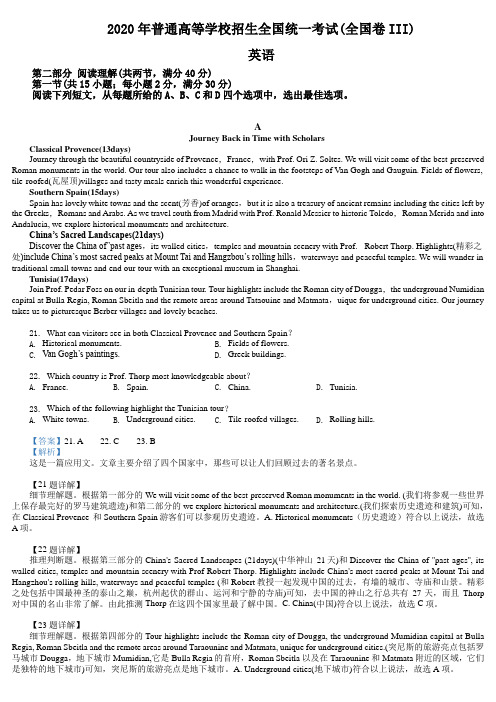
A.Historical monuments.B.Fields of flowers.
C.Van Gogh’s paintings.D.Greek buildings.
【23题详解】
细节理解题。根据第四部分的Tour highlights include the Roman city of Dougga, the underground Mumidian capital at Bulla Regia, Roman Sbeitla and the remote areas around Taraounine and Matmata, unique for underground cities.(突尼斯的旅游亮点包括罗马城市Dougga,地下城市Mumidian,它是Bulla Regia的首府,Roman Sbeitla以及在Taraounine和Matmata附近的区域,它们是独特的地下城市)可知,突尼斯的旅游亮点是地下城市。A. Underground cities(地下城市)符合以上说法,故选A项。
【22题详解】
推理判断题。根据第三部分的China's Sacred Landscapes (21days)(中华神山21天)和Discover the China of ''past ages'', its walled cities, temples and mountain scenery with Prof Robert Thorp. Highlights include China's most sacred peaks at Mount Tai and Hangzhou's rolling hills, waterways and peaceful temples (和Robert教授一起发现中国的过去,有墙的城市、寺庙和山景。精彩之处包括中国最神圣的泰山之巅,杭州起伏的群山、运河和宁静的寺庙)可知,去中国的神山之行总共有27天,而且Thorp对中国的名山非常了解。由此推测Thorp在这四个国家里最了解中国。C. China(中国)符合以上说法,故选C项。
2020年全国卷Ⅲ英语高考题及答案

全国统一高考英语试卷(新课标Ⅲ)Journey Back in Time with ScholarsClassical Provence(13days)Journey through the beautiful countryside of Provence,France,with Prof. Ori Z. Soltes. We will visit some of the best-preserved Roman monuments in the world. Our tour also includes a chance to walk in the footsteps of Van Gogh and Gauguin. Fields of flowers,tile-roofed(瓦屋顶)villages and tasty meals enrich this wonderful experience.Southern Spain(15days)Spain has lovely white towns and the scent(芳香)of oranges,but it is also a treasury of ancient remains including the cities left by the Greeks,Romans and Arabs. As we travel south from Madrid with Prof. Ronald Messier to historic Toledo,Roman Merida and into Andalucia, we explore historical monuments and architecture.China’s Sacred Landscapes(21days)Discover the China of”past ages,its walled cities,temples and mountain scenery with Prof. Robert Thorp. Highlights(精彩之处)include China’s most sacred peaks at Mount Tai and Hangzbou’s rolling hills,waterways and peaceful temples. We will wander in traditional small towns and end our tour with an exceptional museum in Shanghai.Tunisia(17days)Join Prof. Pedar Foss on our in-depth Tunisian tour. Tour highlights include the Roman city of Dougga,the underground Numidian capital at Bulla Regia, Roman Sbeitla and the remote areas around Tataouine and Matmata,uique for underground cities. Our journey takes us to picturesque Berber villages and lovely beaches.21.What can visitors see in both Classical Provence and Southern Spain?A.Historical monuments. B.Fields of flowers.C.Van Gogh’s paintings.D.Greek buildings. 22.Which country is Prof. Thorp most knowledgeable about?A.France. B.Spain. C.China. D.Tunisia. 23.Which of the following highlight the Tunisian tour?A.White towns. B.Underground cities. C.Tile-roofed villages. D.Rolling hills.【答案】21. A22. C23. B【解析】【分析】这是一篇应用文。
2020年高考全国卷Ⅲ英语(含答案)

2020年高考全国卷Ⅲ英语(含答案)-CAL-FENGHAI-(2020YEAR-YICAI)_JINGBIAN绝密★启用前2020年普通高等学校招生全国统一考试(全国卷III)英语注意事项:1. 答卷前,考生务必将自己的姓名、准考证号填写在答题卡和试卷指定位置上。
2. 回答选择题时,选出每小题答案后,用铅笔把答题卡上对应题目的答案标号涂黑。
如需改动,用橡皮擦干净后,再选涂其他答案标号。
回答非选择题时,将答案写在答题卡上,写在本试卷上无效。
3. 考试结束后,将本试卷和答题卡一并交回。
第一部分听力(共两节,满分30分)做题时,先将答案标在试卷上。
录音内容结束后,你将有两分钟的时间将试卷上的答案转涂到答题卡上。
第一节(共5小题;每小题1.5分,满分7.5分)听下面5段对话。
每段对话后有一个小题,从题中所给的A、B、C三个选项中选出最佳选项。
听完每段对话后,你都有10秒钟的时间来回答有关小题和阅读下一小题。
每段对话仅读一遍。
例:How much is the shirtA. £19.15.B. £9.18.C. £9.15.答案是C。
1. Where does the conversation probably take place?A. In a supermarket.B. In the post office.C. In the street.2. What did Carl do?A. He designed a medal.B. He fixed a TV set.C. He took a test.3. What does the man do?A. He’s a tailor.B. He’s a waiter.C. He’s ashop assistant.4. When will the flight arrive?A. At 18:20.B. At 18:35.C. At18:50.5. How can the man improve his article?A. By deleting unnecessary words.B. By adding a couple of points.C. By correcting grammar mistakes.第二节(共15小题;每小题1.5分,满分22.5分)听下面5段对话或独白。
2020全国高考新课标卷三(英语)_参考答案
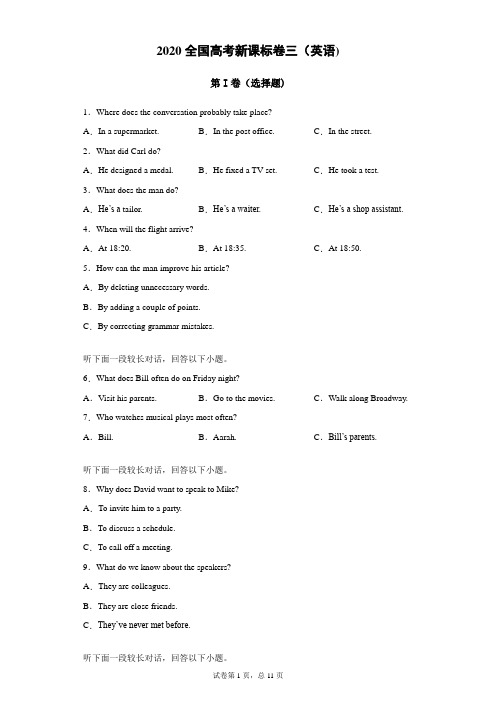
B.650 euros.
C.470 euros.
听下面一段较长对话,回答以下小题。
13.Who is Clifford?
A.A little girl.
B.The man’s pet.
C.A fictional character.
14.Who suggested that Norman paint for children’s books?
C.Making small talk interesting.
Journey Back in Time with Scholars
Classical Provence(13days)
Journey through the beautiful countryside of Provence,France,with Prof. Ori Z. Soltes. We will visit some of the best-preserved Roman monuments in the world. Our tour also includes a chance to walk in the footsteps of Van Gogh and Gauguin. Fields of flowers, tile-roofed(瓦屋顶)villages and tasty meals enrich this wonderful experience.
A.Politics.
B.Movies.
C.Salaries.
20.What does the speaker recommend at the end of his lecture?
A.Asking open-ended questions.
(精校版)2020年全国卷Ⅲ英语高考试题文档版(含答案)

绝密★启用前2020年普通高等学校招生全国统一考试(全国卷III)英语注意事项:1. 答卷前,考生务必将自己的姓名、准考证号填写在答题卡和试卷指定位置上。
2. 回答选择题时,选出每小题答案后,用铅笔把答题卡上对应题目的答案标号涂黑。
如需改动,用橡皮擦干净后,再选涂其他答案标号。
回答非选择题时,将答案写在答题卡上,写在本试卷上无效。
3. 考试结束后,将本试卷和答题卡一并交回。
第一部分听力(共两节,满分30分)做题时,先将答案标在试卷上。
录音内容结束后,你将有两分钟的时间将试卷上的答案转涂到答题卡上。
第一节(共5小题;每小题1.5分,满分7.5分)听下面5段对话。
每段对话后有一个小题,从题中所给的A、B、C三个选项中选出最佳选项。
听完每段对话后,你都有10秒钟的时间来回答有关小题和阅读下一小题。
每段对话仅读一遍。
例:How much is the shirt?A. £19.15.B. £9.18.C. £9.15.答案是C。
1. Where does the conversation probably take place?A. In a supermarket.B. In the post office.C. In the street.2. What did Carl do?A. He designed a medal.B. He fixed a TV set.C. He took a test.3. What does the man do?A. He’s a tailor.B. He’s a waiter.C. He’s a shop assistant.4. When will the flight arrive?A. At 18:20.B. At 18:35.C. At 18:50.5. How can the man improve his article?A. By deleting unnecessary words.B. By adding a couple of points.C. By correcting grammar mistakes.第二节(共15小题;每小题1.5分,满分22.5分)听下面5段对话或独白。
2020年高考真题——英语(全国卷Ⅲ)含答案

绝密★启用前2020年普通高等学校招生全国统一考试(全国卷III)英语注意事项:1. 答卷前,考生务必将自己的姓名、准考证号填写在答题卡和试卷指定位置上。
2. 回答选择题时,选出每小题答案后,用铅笔把答题卡上对应题目的答案标号涂黑。
如需改动,用橡皮擦干净后,再选涂其他答案标号。
回答非选择题时,将答案写在答题卡上,写在本试卷上无效。
3. 考试结束后,将本试卷和答题卡一并交回。
第一部分听力(共两节,满分30分)做题时,先将答案标在试卷上。
录音内容结束后,你将有两分钟的时间将试卷上的答案转涂到答题卡上。
第一节(共5小题;每小题1.5分,满分7.5分)听下面5段对话。
每段对话后有一个小题,从题中所给的A、B、C三个选项中选出最佳选项。
听完每段对话后,你都有10秒钟的时间来回答有关小题和阅读下一小题。
每段对话仅读一遍。
例:How much is the shirt?A. £19.15.B. £9.18.C. £9.15.答案是C。
1. Where does the conversation probably take place?A. In a supermarket.B. In the post office.C. In the street.2. What did Carl do?A. He designed a medal.B. He fixed a TV set.C. He took a test.3. What does the man do?A. He’s a tailor.B. He’s a waiter.C. He’s a shop assistant.4. When will the flight arrive?A. At 18:20.B. At 18:35.C. At 18:50.5. How can the man improve his article?A. By deleting unnecessary words.B. By adding a couple of points.C. By correcting grammar mistakes.第二节(共15小题;每小题1.5分,满分22.5分)听下面5段对话或独白。
2020年高考英语全国卷3及答案

英语试卷第1页(共28页)英语试卷第2页(共28页)绝密★启用前2020年普通高等学校招生全国统一考试·全国Ⅲ卷英语注意事项:1.答卷前,考生务必将自己的姓名、准考证号填写在答题卡和试卷指定位置上。
2.回答选择题时,选出每小题答案后,用铅笔把答题卡上对应题目的答案标号涂黑。
如需改动,用橡皮擦干净后,再选涂其他答案标号。
回答非选择题时,将答案写在答题卡上,写在本试卷上无效。
3.考试结束后,将本试卷和答题卡一并交回。
第一部分听力(共两节,满分30分)做题时,先将答案标在试卷上。
录音内容结束后,你将有两分钟的时间将试卷上的答案转涂到答题卡上。
第一节(共5小题;每小题1.5分,满分7.5分)听下面5段对话。
每段对话后有一个小题,从题中所给的A 、B 、C 三个选项中选出最佳选项。
听完每段对话后,你都有10秒钟的时间来回答有关小题和阅读下一小题。
每段对话仅读一遍。
例:How much is the shirt?A.£19.15.B.£9.18.C.£9.15.答案是C 。
1.Where does the conversation probably take place?A.In a supermarket. B.In the post office.C.In the street.2.What did Carl do?A.He designed a medal. B.He fixed a TV set. C.He took a test.3.What does the man do?A.He’s a tailor.B.He’s a waiter.C.He’s a shop assistant.4.When will the flight arrive?A.At 18:20.B.At 18:35.C.At 18:50.5.How can the man improve his article?A.By deleting unnecessary words.B.By adding a couple of points.C.By correcting grammar mistakes.第二节(共15小题;每小题1.5分,满分22.5分)听下面5段对话或独白。
2020年高考英语全国三卷(精校+精析)
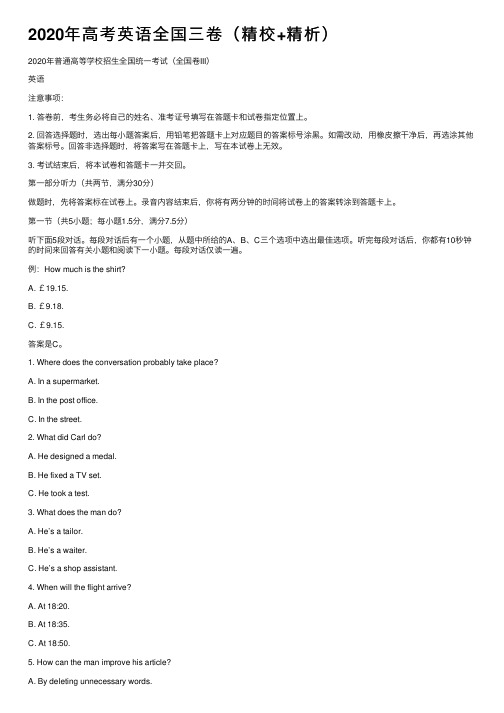
2020年⾼考英语全国三卷(精校+精析)2020年普通⾼等学校招⽣全国统⼀考试(全国卷III)英语注意事项:1. 答卷前,考⽣务必将⾃⼰的姓名、准考证号填写在答题卡和试卷指定位置上。
2. 回答选择题时,选出每⼩题答案后,⽤铅笔把答题卡上对应题⽬的答案标号涂⿊。
如需改动,⽤橡⽪擦⼲净后,再选涂其他答案标号。
回答⾮选择题时,将答案写在答题卡上,写在本试卷上⽆效。
3. 考试结束后,将本试卷和答题卡⼀并交回。
第⼀部分听⼒(共两节,满分30分)做题时,先将答案标在试卷上。
录⾳内容结束后,你将有两分钟的时间将试卷上的答案转涂到答题卡上。
第⼀节(共5⼩题;每⼩题1.5分,满分7.5分)听下⾯5段对话。
每段对话后有⼀个⼩题,从题中所给的A、B、C三个选项中选出最佳选项。
听完每段对话后,你都有10秒钟的时间来回答有关⼩题和阅读下⼀⼩题。
每段对话仅读⼀遍。
例:How much is the shirt?A. £19.15.B. £9.18.C. £9.15.答案是C。
1. Where does the conversation probably take place?A. In a supermarket.B. In the post office.C. In the street.2. What did Carl do?A. He designed a medal.B. He fixed a TV set.C. He took a test.3. What does the man do?A. He’s a tailor.B. He’s a waiter.C. He’s a shop assistant.4. When will the flight arrive?A. At 18:20.B. At 18:35.C. At 18:50.5. How can the man improve his article?A. By deleting unnecessary words.B. By adding a couple of points.C. By correcting grammar mistakes.第⼆节(共15⼩题;每⼩题1.5分,满分22.5分)听下⾯5段对话或独⽩。
2020年高考英语全国卷3含答案(A4打印版)

绝密★启用前2020年普通高等学校招生全国统一考试·全国Ⅲ卷英语注意事项:1.答卷前,考生务必将自己的姓名、准考证号填写在答题卡和试卷指定位置上。
2.回答选择题时,选出每小题答案后,用铅笔把答题卡上对应题目的答案标号涂黑。
如需改动,用橡皮擦干净后,再选涂其他答案标号。
回答非选择题时,将答案写在答题卡上,写在本试卷上无效。
3.考试结束后,将本试卷和答题卡一并交回。
第一部分听力(共两节,满分30分)做题时,先将答案标在试卷上。
录音内容结束后,你将有两分钟的时间将试卷上的答案转涂到答题卡上。
第一节(共5小题;每小题1.5分,满分7.5分)听下面5段对话。
每段对话后有一个小题,从题中所给的A、B、C三个选项中选出最佳选项。
听完每段对话后,你都有10秒钟的时间来回答有关小题和阅读下一小题。
每段对话仅读一遍。
例:How much is the shirt?A. £19.15.B. £9.18.C. £9.15.答案是C。
1. Where does the conversation probably take place?A. In a supermarket.B. In the post office.C. In the street.2. What did Carl do?A. He designed a medal.B. He fixed a TV set.C. He took a test.3. What does the man do?A. He’s a tailor.B. He’s a waiter.C. He’s a shop assistant.4. When will the flight arrive?A. At 18:20.B. At 18:35.C. At 18:50.5. How can the man improve his article?A. By deleting unnecessary words.B. By adding a couple of points.C. By correcting grammar mistakes.第二节(共15小题;每小题1.5分,满分22.5分)听下面5段对话或独白。
精品解析:2020年全国统一高考英语试卷(新课标Ⅲ)(解析版)
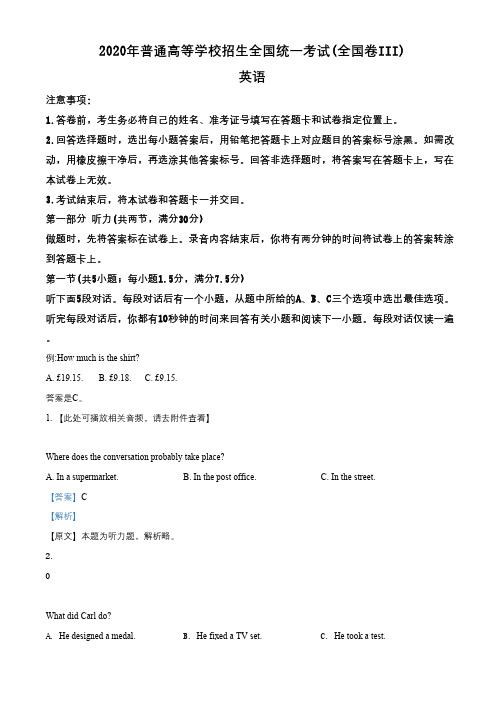
【答案】21. A 22. C 23. B
【解析】
这是一篇应用文。文章主要介绍了四个国家中,那些可以让人们回顾过去的著名景点。
6. What does Bill often do on Friday night?
A. Visit his parents.
B. Go to the movies.
7. Who watches musical plays most often?
A. Bill.
B. Aarah.
【答案】6. B 7. B
What does the man do?
A. He’s a tailor.
B. He’s a waiter.
【答案】A
【解析】
【原文】本题为听力题,解析略。
4.
0
C. He’s a shop assistant.
When will the flight arrive?
A. At 18:20.
பைடு நூலகம்
B. At 18:35.
【答案】C
【解析】
【原文】本题为听力题,解析略。
5.
0
C. At 18:50.
How can the man improve his article? A. By deleting unnecessary words. B. By adding a couple of points. C. By correcting grammar mistakes. 【答案】A 【解析】 【原文】本题为听力题,解析略。
第二部分 阅读理解(共两节,满分40分) 第一节(共15小题;每小题2分,满分30分) 阅读下列短文,从每题所给的A、B、C和D四个选项中,选出最佳选项。
2020年高考英语全国三卷(精校+精析)
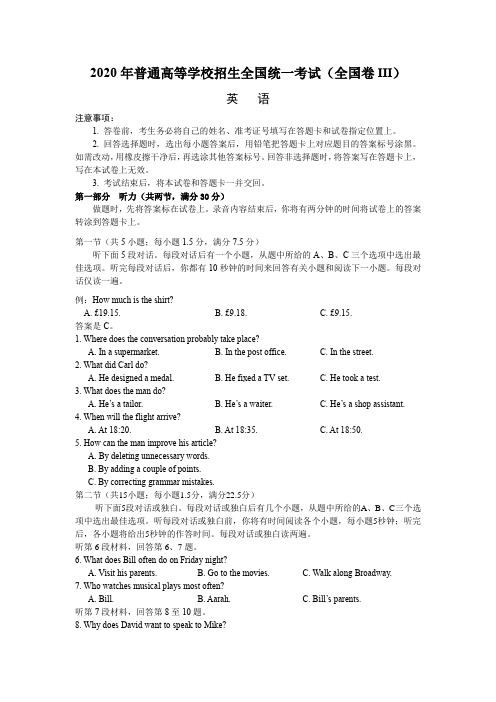
2020年普通高等学校招生全国统一考试(全国卷III)英语注意事项:1. 答卷前,考生务必将自己的姓名、准考证号填写在答题卡和试卷指定位置上。
2. 回答选择题时,选出每小题答案后,用铅笔把答题卡上对应题目的答案标号涂黑。
如需改动,用橡皮擦干净后,再选涂其他答案标号。
回答非选择题时,将答案写在答题卡上,写在本试卷上无效。
3. 考试结束后,将本试卷和答题卡一并交回。
第一部分听力(共两节,满分30分)做题时,先将答案标在试卷上。
录音内容结束后,你将有两分钟的时间将试卷上的答案转涂到答题卡上。
第一节(共5小题;每小题1.5分,满分7.5分)听下面5段对话。
每段对话后有一个小题,从题中所给的A、B、C三个选项中选出最佳选项。
听完每段对话后,你都有10秒钟的时间来回答有关小题和阅读下一小题。
每段对话仅读一遍。
例:How much is the shirt?A. £19.15.B. £9.18.C. £9.15.答案是C。
1. Where does the conversation probably take place?A. In a supermarket.B. In the post office.C. In the street.2. What did Carl do?A. He designed a medal.B. He fixed a TV set.C. He took a test.3. What does the man do?A. He’s a tailor.B. He’s a waiter.C. He’s a shop assistant.4. When will the flight arrive?A. At 18:20.B. At 18:35.C. At 18:50.5. How can the man improve his article?A. By deleting unnecessary words.B. By adding a couple of points.C. By correcting grammar mistakes.第二节(共15小题;每小题1.5分,满分22.5分)听下面5段对话或独白。
2020年高考英语全国卷III及答案

2020年高考英语全国卷III及答案注意事项:1. 答卷前,考生务必将自己的姓名、准考证号填写在答题卡和试卷指定位置上。
2. 回答选择题时,选出每小题答案后,用铅笔把答题卡上对应题目的答案标号涂黑。
如需改动,用橡皮擦干净后,再选涂其他答案标号。
回答非选择题时,将答案写在答题卡上,写在本试卷上无效。
3. 考试结束后,将本试卷和答题卡一并交回。
第一部分听力(共两节,满分30分)做题时,先将答案标在试卷上。
录音内容结束后,你将有两分钟的时间将试卷上的答案转涂到答题卡上。
第一节(共5小题;每小题1.5分,满分7.5分)听下面5段对话。
每段对话后有一个小题,从题中所给的A、B、C三个选项中选出最佳选项。
听完每段对话后,你都有10秒钟的时间来回答有关小题和阅读下一小题。
每段对话仅读一遍。
例:How much is the shirt?A. £19.15.B. £9.18.C. £9.15.答案是C。
1. Where does the conversation probably take place?A. In a supermarket.B. In the post office.C. In the street.2. What did Carl do?A. He designed a medal.B. He fixed a TV set.C. He took a test.3. What does the man do?A. He’s a tailor.B. He’s a waiter.C. He’s a shop assistant.4. When will the flight arrive?A. At 18:20.B. At 18:35.C. At 18:50.5. How can the man improve his article?A. By deleting unnecessary words.B. By adding a couple of points.C. By correcting grammar mistakes.第二节(共15小题;每小题1.5分,满分22.5分)听下面5段对话或独白。
- 1、下载文档前请自行甄别文档内容的完整性,平台不提供额外的编辑、内容补充、找答案等附加服务。
- 2、"仅部分预览"的文档,不可在线预览部分如存在完整性等问题,可反馈申请退款(可完整预览的文档不适用该条件!)。
- 3、如文档侵犯您的权益,请联系客服反馈,我们会尽快为您处理(人工客服工作时间:9:00-18:30)。
2016年普通高等学校全国统一考试(新课标全国卷III)英语注意事项:本试卷分第I卷(选择题)和第II卷(非选择题)两部分。
考试结束后.将本试卷和答题卡一并交回。
第I卷注意事项:1.答第I卷前,考考生务必将自己的姓名、考生号填写在答题卡上。
2.选出每小题答案后,用铅笔把答题卡上对应的题目的答案标号涂黑。
如需改动,用橡皮擦干净后,在选涂其他答案标号。
不能答在本试卷,否则无效。
第一部分阅读理解(共两节,满分40分)第一节(共15小题;每小题2分,满分30分)阅读下列短文,从每题所给的四个选项(A、B、C和D)中,选出最佳选项,并在答题卡上将该项涂黑。
AMusicOpera at Music Hall: 1243 Elm Street. The season runs June through August, with additional performances in March and September. The Opera honors Enjoy the Arts membership discounts. Phone: 241-2742. .Chamber Orchestra: The Orchestra plays at Memorial Hall at 1406 Elm Street, which offers several concerts from March through June. Call 723-1182 for more information. http:// Symphony Orchestra: At Music Hall and Riverbend. For ticket sales, call 381-3300. Regular season runs September through May at Music Hall in summer at Riverbend. .College Conservatory of Music (CCM): Performances are on the main campus(校园) of the university, usually at Patricia Cobbett Theater. CCM organizes a variety of events, including performances by the well-known LaSalle Quartet, CCM’s Philharmonic Orchestra, and various groups of musicians presenting Baroque through modern music. Students with I.D. cards can attend the events for free. A free schedule of events for each term is available by calling the box office at 556-4183. .edu/events/calendar.Riverbend Music Theater: 6295 Kellogg Ave. Large outdoor theater with the closest seats under cover (price difference).Big name shows all summer long! Phone:232-6220. .1. Which number should you call if you want to see an opera?A. 241-2742.B. 723-1182.C. 381-3300.D. 232-6220.2. When can you go to a concert by Chamber Orchestra?A. February.B. May.C. August.D. November.3.Where can students go for free performances with their I.D. cards?A. Music Hall.B. Memorial Hall.C. Patricia Cobbett Theater.D. Riverbend Music Theater.4. How is Riverbend Music Theater different from the other places?A. It has seats in the open air.B. It gives shows all year round.C. It offers membership discounts.D. It presents famous musical works.BOn one of her trips to New York several years ago, Eudora Welty decided to take a couple of New York friends out to dinner. They settled in at a comfortable East Side cafe and within minutes, another customer was approaching their table.“Hey, aren’t you from Mississippi?” the elegant, white-haired writer remembered being asked by the stranger. “I’m from Mississippi too.”Without a second thought, the woman joined the Welty party. When her dinner partner showed up, she also pulled up a chair.“They began telling me all the news of Mississippi,”Welty said. “I didn’t know what my New York friends were thinking.”Taxis on a rainy New York night are rarer than sunshine. By the time the group got up to leave, it was pouring outside. Welty’s new friends immediately sent a waiter to find a cab. Heading back downtown toward her hotel, her big-city friends were amazed at the turn of events that had changed their Big Apple dinner into a Mississippi.“My friends said: ‘Now we believe your stories,’” Welty added. “And I said: ‘Now you know.These are the people that make me write them.’”Sitting on a sofa in her room, Welty, a slim figure in a simple gray dress, looked pleased with this explanation.“I don’t make them up,” she said of the characters in her fiction these last 50 or so years. “I don’t have to.”Beauticians, bartenders, piano players and people with purple hats, Welty’s people come from afternoons spent visiting with old friends, from walks through the streets of her native Jackson, Miss., from conversations overheard on a bus. It annoys Welty that, at 78, her left ear has now given out. Sometimes, sitting on a bus or a train, she hears only a fragment(片段) of a particularly interesting story.5. What happened when Welty was with her friends at the cafe?A. Two strangers joined her.B. Her childhood friends came in.C. A heavy rain ruined the dinner.D. Some people held a party there.6. The underlined word “them” in Paragraph 6 refers to Welty’s .A. readersB. partiesC. friendsD. stories7. What can we learn about the characters in Welty’s fiction?A. They live in big cities.B. They are mostly women.C. They come from real life.D. They are pleasure seekers.CIf you are a fruit grower—or would like to become one—take advantage of Apple Day to see what’s around. It’s called Apple Day but in practice it’s more like Apple Month. The day itself is on October 21, but since it has caught on, events now spread out over most of October around Britain.Visiting an apple event is a good chance to see, and often taste, a wide variety of apples. To people who are used to the limited choice of apples such as Golden Delicious and Royal Gala in supermarkets, it can be quite an eye opener to see the range of classical apples still in existence,such as Decio which was grown by the Romans. Although it doesn’t taste of anything special, it’s still worth a try, as is the knobbly(多疙瘩的) Cat’s Head which is more of a curiosity than anything else.There are also varieties developed to suit specific local conditions. One of the very best varieties for eating quality is Orleans Reinette, but you’ll need a warm, sheltered place with perfect soil to grow it, so it’s a pipe dream for most apple lovers who fall for it.At the events, you can meet expert growers and discuss which ones will best suit your conditions, and because these are family affairs, children are well catered for with apple-themed fun and games.Apple Days are being held at all sorts of places with an interest in fruit, including stately gardens and commercial orchards(果园).If you want to have a real orchard experience, try visiting the National Fruit Collection at Brogdale, near Faversham in Kent.8.What can people do at the apple events?A. Attend experts’ lectures.B. Visit fruit-loving families.C. Plant fruit trees in an orchard.D. Taste many kinds of apples.9.What can we learn about Decio?A. It is a new variety.B. It has a strange look.C. It is rarely seen now.D. It has a special taste.10. What does the underlined phrase “a pipe dream” in Paragraph 3mean?A. A practical idea.B. A vain hope.C.A brilliant plan.D. A selfish desire.11.What is the aut hor’s p urpose in writing the text?A. To show how to grow apples.B .To introduce an apple festival.C. To help people select apples.D. To promote apple research.DBad news sells. If it bleeds, it leads. No news is good news, and good news is no news. Those are the classic rules for the evening broadcasts and the morning papers. But now that information is being spread and monitored(监控) in different ways, researchers are discovering new rules. Bytracking people’s e-mails and online posts, scientists have found that good news can spread faster and farther than disasters and sob stories.“The ‘if it bleeds’ rule works for mass media,” says Jonah Berger, a scholar at the University of Pennsylvania. “They want your eyeballs and don’t care how you’re feelin g. But when you share a story with your friends, you care a lot more how they react. You don’t want them to think of you as a Debbie Downer.”Researchers analyzing word-of-mouth communication—e-mails, Web posts and reviews, face-to-face conversations—found that it tended to be more positive than negative(消极的), but that didn’t necessarily mean people preferred positive news. Was positive news shared more often simply because people experienced more good things than bad things? To test for that possibility, Dr. Berger looked at how people spread a particular set of news stories: thousands of articles on The New York Times’ website. He and a Penn colleague analyzed the “most e-mailed” list for six months. One of his first findings was that articles in the science section were much more likely to make the list than non-science articles. He found that science amazed Times’ readers and made them want to share this positive feeling with others.Readers also tended to share articles that were exciting or funny, or that inspired negative feelings like anger or anxiety, but not articles that left them merely sad. They needed to be aroused(激发) one way or the other, and they preferred good news to bad. The more positive an article, the more likely it was to be share d, as Dr. Berger explains in his new book, “Contagious: Why Things Catch On.”12 .What do the classic rules mentioned in the text apply to?A. News reports.B. Research papers.C .Private e-mails. D. Daily conversations.13. What can we infer about people like Debbie Downer?A. They’re socially inactive.B. They’re good at telling stories.C. They’re inconsiderate of others.D. They’re careful with their words.14.Which tended to be the most e-mailed according to Dr. Berger’s research?A . Sports new. B. Science articles.C. Personal accounts.D. Financial reviews.15 .What can be a suitable title for the text?A. Sad Stories Travel Far and WideB .Online News Attracts More PeopleC. Reading Habits Change with the TimesD. Good News Beats Bad on Social Networks第二节(共5小题;每小题2分,满分10分)根据短文内容,从短文后的选项中选出能填入空白处的最佳选项。
